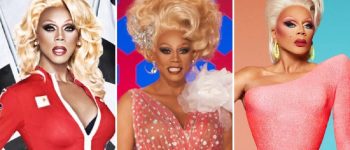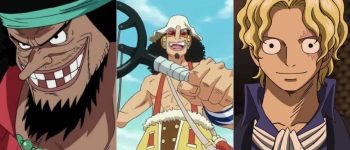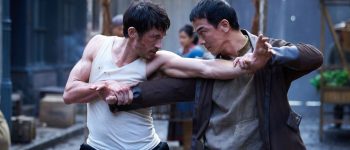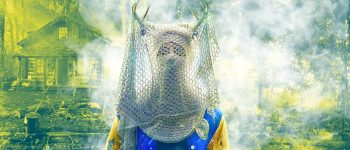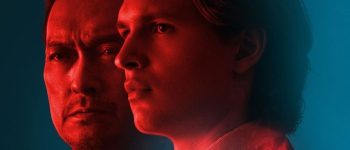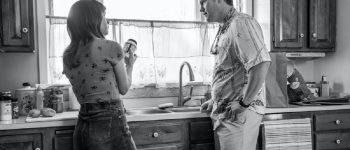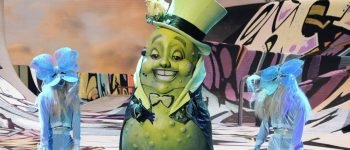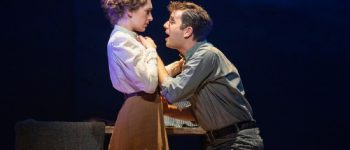Designing costumes for nude models sounds a bit like an oxymoron, but Marie Schley, the costume designer on Starz’s raunchy comedy “Minx,” says otherwise: “You’d be surprised how many clothes are in a nude photo shoot. How else are you gonna know they’re cowboys?”
- Who Are the Spacers in ‘Foundation’?
- Here’s What Sets ‘Gen V’ Apart From ‘The Boys’ According to Star Asa Germann
- Donny Deutsch Slams Hollywood Silence Amid Israel-Hamas War on MSNBC: ‘This Is About the Slaughtering of Jews’
- ‘Stranger Things 4’ Almost Permanently Killed Max: ‘For a While That Was Going to Happen’
- ‘Succession’ Recap: What’s the Deal With the GoJo Deal?
Created by Ellen Rapoport, “Minx” is set in the early ’70s, and follows a team trying to keep their women-targeted porn-magazine afloat (think Ms. meets Playboy.) Originally debuting on Max in 2022, the show found a new home on Starz after Max scrapped it — its second season premiered in July.
Schley, who previously worked on “Yellowjackets,” joined “Minx’s” costume department for the sophomore season. On the surface, Schley’s duties seemed simple: make it fun, make it sexy. But there was a stark amount of character development that she needed to translate through all the jumpsuits and underwear and caftans and lamé. As the show’s central character Joyce (Ophelia Lovibond) grew confident in her womanhood and found independence from her business partner Doug (Jake Johnson) during the second season, her wardrobe became more “cutting edge,” as Schley described to Variety — with Joyce exchanging pantsuits for one-shouldered gowns and blue snake-print chiffon.
Bambi (Jessica Lowe), a happy-go-lucky ex-porn star, opted for short skirts and low-cut dresses in Season 1. But as she moved her way up the ladder at Minx this time around, her outfits have gotten a bit more formal and conservative, until returning to her hippie-slash-groupie style by the finale (with hints that she’s joining a cult.)
One of Schley’s favorite parts of costuming this show was dressing up the men. “We made Richie a tuxedo jumpsuit for the ‘Deep Throat’ premiere, which is so ridiculous and funny to me, but also period-appropriate,” she said. “I love that men had less inhibition about showing off their body, their physiques — being over the top, and experimenting with looks. I think that men’s fashion saw some of its best in that era.”
In an interview with Variety, Schley discussed how she and her team pulled off the X-rated photoshoots, created looks for fictional Joan Didion and Annie Leibovitz — and put men in platform shoes.
Let’s start with some specific characters. First off, Bambi. How did you continue embodying her bubbly spirit throughout her Season 2 wardrobe?
I love Bambi, she’s such a fun character. This season’s really about arcs and transitions. Bambi starts off as a sort of very sexy ex-porn star, and we made her a beautiful dress for the “Deep Throat” premiere based on a vintage dress. As the show progresses, she’s looking for her place in the company, and starts dressing a little bit more professionally. But by the end, she comes back to who she is. We tried to support that arc for the character.
Bambi and Shelly in Minx Season 2. Courtesy of John Johnson.
Was there anyone in particular from that era that you looked to as inspiration for Bambi?
Honestly, we looked at a lot of groupies and younger hippies from that era. Bambi is the most youthful of the bunch, I would say. She’s always really sexy — I mean, she never wears a bra. So even with pieces from the period, we made them a little bit more sexy by, say, making them sleeveless, just to emphasize the fact that she’s very body-conscious.
Joyce’s appearance is a main plot point of Season 2, especially in the episode in which she gets a makeover and Constance says to her, “You don’t need to dress like a man to earn the respect of any of everyone, not anymore.” How did you channel that character arc through her clothing?
Joyce loses herself a little bit this season. She’s a very fundamental, academic feminist through Season 1, but this season, she becomes rich and famous. Besides her looking more feminine — less pantsuits, leaning into her womanhood — I also wanted her to look more cutting edge, more fashionable, like she’s spending money on her clothes. She’s the future.
Joyce in Minx Season 2. Courtesy of John Johnson.
you are watching: ‘Minx’ Costume Designer on Crafting a 1973 Fantasy Wardrobe, From ‘Porno Watergate’ to Joan Didion
There’s a scene where she goes to meet her rocker boyfriend by the pool with groupies in their very distinctive late ‘60s, early ‘70s suede and earth tones. We made Joyce a Halston-esque dress, because that was the year that Halston made his debut in Paris at the Battle of Versailles. It’s this modern, one-shouldered dress, and the idea there is that Joyce is leaning into her womanhood: less girly, less juvenile, and more part of the future, as opposed to just fitting in.
And I wanted to talk about Constance, played by Elizabeth Perkins — she’s new, and she’s a bit of a diva!
We took inspiration from society ladies of the time — a bit more European. She wears a lot of caftans. It’s supposed to express her worldliness, and her ease with her own sexuality. She’s also a bit more retro, more ‘60s hair, more conservative.
Constance in Minx Season 2. Courtesy of John Johnson.
What would you say are some of your favorite aspects of early or mid ‘70s fashion?
It’s so much fun. It really runs the gamut. I love the platform shoes and the outrageous colors. I love that men had less inhibition about showing off their bodies, their physiques — being over the top and experimenting with looks. I think that men’s fashion saw some of its best in that era. From ‘73 to ’75, you still have the over-the-top ‘60s hippie, but also some of that minimalist, modern stuff. Halston was a huge influence for Joyce this season because he’s sort of the future of that ’70s moment. We even got some original Halston pieces. It’s amazing to see how they’re made — they’re not as simple as they look.
Richie and Joyce. Minx, S2. Courtesy of Starz.
Can you talk more about dressing the men? What could you do with their outfits on “Minx” that you weren’t able to do on other shows?
Since it’s a comedy, you can really go for the wilder pieces. We made Richie a tuxedo jumpsuit for the “Deep Throat” premiere, which is so ridiculous and funny to me, but also period-appropriate. I think Doug is such a fun character, too, because he’s so over the top and comfortable with his look — doesn’t matter how outrageous it is. I mean, we made him a blue tuxedo with tails from scratch.
Doug in Minx Season 2. Courtesy of John Johnson.
Just the fact that men are wearing orange platforms says it all to me. Doing a ‘70s show has always been a fantasy of mine. It’s like a dream come true. I’ve always been obsessed about that era, and to be able to do the sexy Valley version was really fun. Even though it was a time of experimentation, there was a lot of innocence there, too. It was sexy, but also playful and innocent. It wasn’t as jaded.
One of my favorite parts of the show is the Minx models, from the Statue of Liberty costume to the cowboy scene. What was designing those like?
First of all, I want to give a shout-out to my assistant designers, Hannah Greene, Corey Mansfield and Dawn Ritz. Also Henry Po, who did all the made-to-order, Katy Bucher, my key costumer and Brooke Thatawat, my supervisor. We had a very hard-working talented crew.
Hannah really helped me spearhead those Minx photoshoots. The Statue of Liberty was probably our showrunner Ellen’s favorite costume. We were constantly coming up with a sexy porno take on everything, and it always was a little bit humorous. There was one episode that mentions Watergate, so we did a porno Watergate shoot. But we didn’t get to show it in the episode — everything had to be a little bit of a “wink, wink.”
You mentioned Hannah Greene. I was looking through her Instagram, and I saw that she posted that classic Burt Reynolds Cosmopolitan centerfold from the ’70s. Did you look at adult magazines of that time for inspiration?
Minx is loosely based on the magazine Viva from the early ‘70s, published by Bob Guccione. We looked at everything from Playboy to Penthouse to get a vibe of what it was like, but I think we applied a little bit more humor than was in those magazines. A lot of that was just women lounging around with giant ostrich feathers or something. Our themes are kind of comedic, and I think they were great.
We would joke around, because at meetings, they’d say, “Well, there’s not going to be that many clothes.” And I’m like, “You’d be surprised how many clothes are in a nude photo shoot. How else are you gonna know they’re cowboys?”
What went into the hair for all of these looks? The beards, the pornstaches, the sideburns — all of those were an important part of the ‘70s looks.
That was not my department, but I will say there was a lot of research from the hair and makeup department, and we often worked together to get the look right. Constance’s bouffant was very much styled after a doyenne socialite look. And there was one day when I went to set and they had giant triptychs of all the different facial hair. Like, boards with lamb chops and millions of mustaches. It was really funny.
There are also a couple of historic fictionalized cameos this season. How did you decide how to style, say, Joan Didion or Annie Leibovitz?
That was really challenging, but I think we might just for whatever was the most iconic look – looks that people have seen in photographs. And obviously, this is 1973 so based on that era of Annie Leibovitz or Crosby, Stills, Nash, and Young.
Tina in Minx Season 2. Courtesy of John Johnson.
How much of the wardrobe would you say is actually from that era?
I would say like 80% vintage 20% new. The suits for Joyce and Doug we made were new, but we did source from online auctions. During the summer, I went to the East Coast and shopped a bunch of vintage stores. We sourced every vintage vendor in Los Angeles — there’s one called Arcade downtown where we found the high-end stuff for Joyce and Constance. We also even went to two people’s houses in Malibu that had clothing collections.
I was hoping you could break down a couple of specific pieces and looks. To start, those goldfish platforms Richie wears. Where are those from and what was the inspiration for them?
Those came to us from the Season 1 costume department. They’re everyone’s favorite on the show. They are modern, but it was very common in that era to have crazy things inside or carved into the heel. The more outrageous, the better.
Joyce in Minx Season 2. Courtesy of John Johnson.
you are watching: ‘Minx’ Costume Designer on Crafting a 1973 Fantasy Wardrobe, From ‘Porno Watergate’ to Joan Didion
How about Joyce’s gold lamé dress from the makeover scene that she ends up passing on?
That’s a vintage piece. I think that was supposed to be something that made her feel incredibly uncomfortable, like she’d gone too far or that she’s turning into a different person in that moment.
And the Army cadet look that Joyce wears on the Rolling Stone cover?
I think the headline was something about “revolution.” So we kind of chose that look based on Che Guevara — but a sexy version.
This interview has been edited and condensed.
Source: https://dominioncinemas.net
Category: TV







